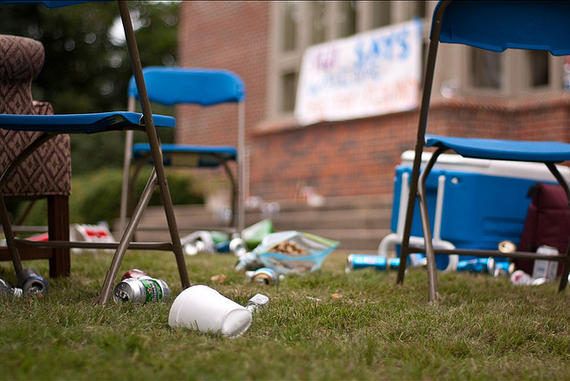Once again Dartmouth's Philip Hanlon is in the news and ahead of the curve, announcing that Dartmouth College will ban hard liquor on campus. He further announced the possibility that individual fraternities or the Greek system as a whole will be eliminated, as part of a far-ranging overhaul of campus life.
I knew I liked this guy. After all, he is the president who admitted Dartmouth's applications were down 14 percent in 2014, a phenomenon he attributed to the College's reputation for excessive partying, extreme alcohol consumption, and the resulting consequences, including sexual assault and rape charges. Nine months ago, he initiated an investigation into Dartmouth campus life, and the findings have resulted in several sensible suggestions. Starting the fall of 2015, Dartmouth freshman will be placed in residential communities that they will stay in through their college years. These communities will contain some resident faculty members and graduate students, and are an attempt to foster communal ties. He also said the college would create new spaces for social events, in an attempt to provide an alternative to the Greek houses that dominate campus life.
While these reforms do not have unqualified support (indeed, the New York Times indicated that it is unlikely that few, if any, institutions are likely to follow Dartmouth's lead, which does rather beg the question of why not?), it is at least a serious and well-considered beginning. And in my view, Hanlon is to be commended for venturing into a transparent process of self-examination that few other colleges and universities have shown the courage to consider. It will be interesting for example, to see if UVA releases its applicant numbers for 2014-15.
Two other recent incidents on college campuses point to the urgent need for a more widespread process of critical reflection. Two Vanderbilt athletes were recently convicted of the gang rape (and inexplicably, the taping) of an unconscious ex-girlfriend of one of the perpetrators. At Stanford, two bicyclists chased and caught a freshman water polo player whom they had discovered raping an unconscious woman on a quad. In both cases, there was some reason to believe we are making some progress against this problem. Much to their evident surprise, the Vandy football players face 15-80 years in prison. And concerned bystanders, who elected to do the right thing, interrupted the Stanford attack.
But to my mind, there is a bigger issue here, namely the question of who in the world thinks it's okay to rape an unconscious woman? Conquering marauding armies? Necrophiliacs? God knows, rape is a crime of violence not sex, but who are these men? What could possibly have informed or contributed to this kind of behavior?
Interestingly, the Vanderbilt athletes offered a clue in their defense arguments. They claimed that the college culture of "binge drinking and promiscuous sex'" led them astray. Rather far astray, I would argue. Whether you believe this defense or not, which I don't, it's clear that young men need help -- help more fundamental than just open discussion on the subject. According to a recent study, one in three men do not mind using force to gain the consent of their sexual partner, though only one in seven would consider this behavior rape.
There are so many disturbing aspects about the findings of this study that it's difficult to know where to begin. But three things are immediately clear to me. 1) "sex education" needs a complete overhaul, 2) extreme, excessive alcohol consumption only further muddles judgment (for both young men and women) that seems compromised to begin with, and 3) single sex male college environments, be they fraternity or sports houses, require consistent, sustained adult supervision.
Sorry alumni. But it's a different world than the one you knew, and it's not pretty.
Binge drinking (in my day, there were often bars on campus, so no one needed to pregame), and the depersonalization produced by social media has profoundly changed the landscape of adolescent interactions and relationships at college. I am willing to bet that you don't want either your daughter or your son to experience the perfect storm of the worst outcomes these changes can produce.
So think, listen, learn, and seriously consider alternatives to your child's college experience. God knows, I drank plenty in college, but I can count on one hand the number of times I "did" shots. Combine that with the reality that most of us struggle to keep up with constant technological innovations. Now imagine how little we really understand about how life has changed life on college campuses. We have a lot of work to do.
